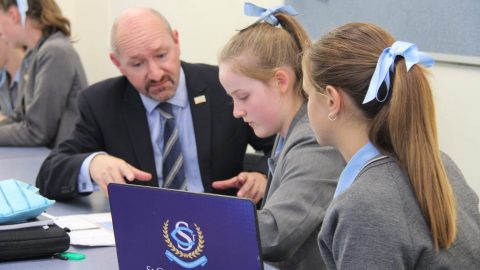From the Director of Curriculum Innovation and Development

Former US Secretary of State, Donald Rumsfeld, once famously stated that “there are known knowns. These are the things we know that we know. There are known unknowns. That is to say, there are things that we know we don’t know. But there are also unknown unknowns.” Trying to venture into the world of the ‘unknown unknowns’ is like trying to find a black cat in a pitch black room – a job made very much harder if no cat actually even exists. Perhaps for this reason, we are all more comfortable, and more certain, in putting energy into the things that we know and we tend to ignore the unknown, fearing change might lead us there. Depending upon your viewpoint, it is either the security of the known which prevents us from changing or it is the fear of the unknown. But in a world of increasing complexity and diverging opportunity, remaining simply in the ‘known’ is not anymore a certain recipe for improvement – and as the known increases so too does the unknown.
Imagine all human knowledge is an island. As the collective knowledge of humanity, the known, exponentially increases, so too does the island in size. Imagine now that the island sits in an ocean of ‘unknown’, a sea of ignorance, then as the island of knowledge grows so too does its shoreline with the ocean of unknowns. Consequently, as we learn more, we also learn that there is so much more we don’t know and that the shoreline between our knowledge, our known, and that of all our unknowns grows too. We can either look internally, scavenging the island, sitting beneath a familiar palm tree, or we can look out from the shore and wonder at the vast body that lies before us. Either way suggests a type of thinking – one nimble and adept, one certain and stubborn, one suited to the innovative and complex world of today, one possibly suited to an increasingly bygone age.
In the 1950s the essayist Isaiah Berlin wrote an essay entitled The Hedgehog and the Fox, a work loosely based upon a parable by the ancient Greek poet Archilochus. In it, Berlin divided the world into two types of thinkers – Hedgehogs have very specialised knowledge, whilst Foxes tend to be more multidisciplinary. Hedgehogs are confident in their world view, which is often ideological, and are difficult to shift, they seek order and certainty in thinking; Foxes are adaptable, they are tolerant of complexity, they are often self-critical and empirical. In reality, we all tend to move between the two, but leaders of education must be the ones on the shoreline and to be that ‘foxy thinking’ is required.
In his book The Wisdom of Practice, Professor Lee Shulman writes:
Classroom teaching…..is perhaps the most complex, most challenging, and most demanding, subtle, nuanced, and frightening activity that our species has ever invented…..The only time a physician could possibly encounter a situation of comparable complexity would be in the emergency room of a hospital during or after a natural disaster.
Essentially, what teachers do in a classroom contains so many alternatives, so many imponderables, that no one can reduce it to a simple certainty. If teachers take on ‘hedgehog thinking’, where they are certain that this is the way things should be done then they are island dwellers and lessons become less engaging, more surface orientated with little depth; rather, teachers should seek the uncertainty, set the complex challenge, be adaptable and stand on the shoreline. Learning is far too important to be sitting under the palm tree, safe in focusing only on the knowns – so my advice is simple… embrace the unknowns, you won’t regret it.


